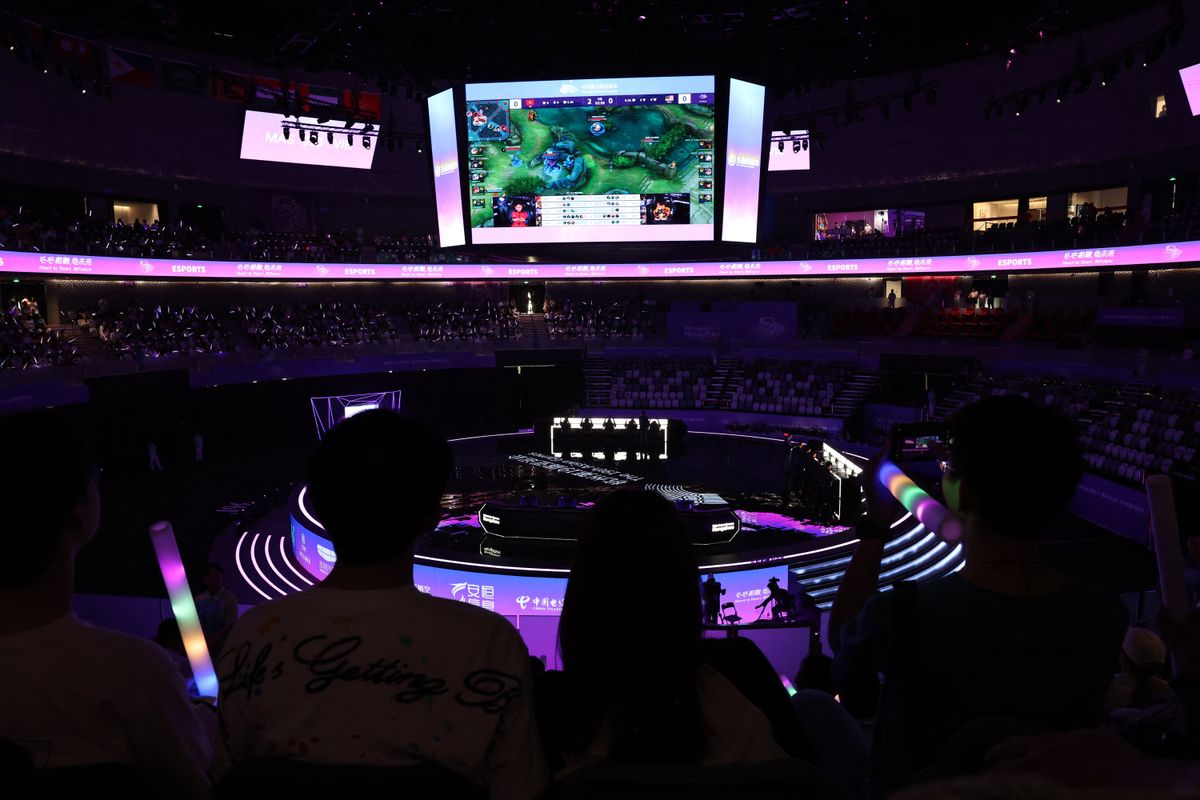The rise of esports in China – a key highlight of the 2023 Asian Games
Tencent has taken a big role at the Hangzhou Asian Games, particularly in esports.

A few minutes every morning is all you need.
Stay up to date on the world's Headlines and Human Stories. It's fun, it's factual, it's fluff-free.
The backstory: Over the past few years, China has been taking steps to regulate its gaming industry, especially concerning young players and gaming and internet addiction. Its efforts have included playtime restrictions, age verification requirements and mandating the use of real names during player registration. In 2021, China even stopped approving new video games temporarily. But, in a surprise move in April, it started approving some new games again, suggesting a softening stance from regulators.
While Beijing has some concerns about video games and how they might affect youth, it’s fully embraced esports and has even introduced academic degrees in esports-related fields. China currently has the world's largest esports scene, with the highest number of players and tournament viewers globally, closely followed by the US. The government tends to see esports in a different light – more as a legit sport that promotes team spirit, according to Mario Ho, chairman of NIP Group, an esports firm backed by state funds.
More recently: In August, tech giant Tencent described esports as an "emerging sport" at a pivotal stage of development. Tencent has had its eye on pro gaming for a while and has incorporated it into its long-term strategy. For example, when Tencent launched the popular shooter game Valorant in China, the company quickly organized esports tournaments that sold out in minutes.
Even though esports makes up only a part of Tencent's US$80 billion in yearly sales, it boosts its core gaming business and complements other areas like streaming, music and social media. The company has even created a scripted web series surrounding its game Honor of Kings. It’s also ventured into real-world locations like esports-themed hotels.
On Saturday, Chinese President Xi Jinping officially inaugurated the 19th Asian Games in Hangzhou. This edition of the Asian Games is making headlines as the largest ever, featuring about 12,000 athletes from 45 nations and territories competing in 40 sports. The 19th Asian Games have also included modern sports like esports, breakdancing and climbing. Hangzhou even built a futuristic, spaceship-shaped esports stadium capable of holding a huge crowd.
The development: Tencent has taken a big role at the Hangzhou Asian Games, particularly in esports. The tech company is involved in producing or publishing four out of the seven esports titles featured at the event.
Tencent also customized its games for the occasion, including some of Hangzhou's famous tourist spots and Asian Games mascots into the virtual world of Honor of Kings. Esports is also set to return as a medal event in the 2026 Asian Games in Japan.
But this week, news emerged that platforms including Tencent and Huya were told to only stream the semifinals and finals for some multiplayer games, leaving some fans disappointed when they logged on hoping to catch replays and quarterfinal competitions. Sources speaking to Bloomberg said concerns about internet addiction were at least partly behind the move.
Key comments:
"Tencent's first ever product was QQ, which grew way beyond a messaging app to become a platform connecting users to the whole company. Esports serves a similar purpose," said Mars Hou, general manager of Tencent's esports division. "It's a new language that brings young people across the world together."
"In 2023, China's online gaming will get back to growth, but (it won't be) huge at all," said Chenyu Cui, an analyst at research firm Omdia in January. "Growth will be slow and gradual."
"E-sports have primarily always been about gaming in the past 15 plus years," said Marcus Tan, a two-time World Cyber Games champion in Warcraft 3, to CNA. "To say that 'e-sports is not just gaming' and not include actual e-sports programmes seems to be overlooking the efforts of all the people in our nation who are immensely passionate about actual e-sports."
"We view Tencent's launch of a gaming league as a positive and bodes well for both the company and the broader Chinese gaming sector in 2023 and beyond," said Esme Pau, an analyst with Macquarie Capital. "With NPPA's approvals for both domestic and imported games (such as Valorant) signaling higher transparency, Chinese game companies are better positioned to invest and launch marketing efforts around major franchises and hence drive higher gaming momentum and revenue."




Comments ()